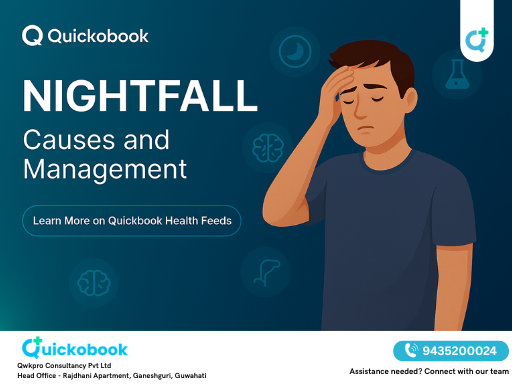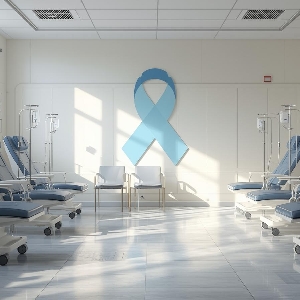1. Introduction
Nightfall, medically known as nocturnal emission, is a phenomenon that has puzzled, embarrassed, and often worried countless men across generations. Especially prevalent among adolescents and young adults, it involves the involuntary ejaculation of semen during sleep. Despite being a natural part of sexual development, nightfall is surrounded by societal myths, cultural taboos, and misinformation, particularly in conservative communities. Many young men suffer in silence, wrongly believing something is wrong with their bodies or that they are "wasting" their strength.
This comprehensive guide by Quickobook aims to shed light on the truth behind nightfall, bust myths, explain causes, and offer solutions—all with a reassuring, medically sound, and stigma-free approach.
2. What is Nightfall (Wet Dreams)?
Nightfall refers to the unintentional release of semen during sleep, often associated with erotic dreams. It is most common during adolescence and early adulthood but can happen to men of all ages. The medical term for this condition is "nocturnal emission."
It usually occurs during the Rapid Eye Movement (REM) phase of sleep when dreaming activity is heightened. The discharge may or may not be remembered upon waking up, and it may be noticed as a wet stain on undergarments or bedsheets.
It is neither an illness nor a disorder, but a physiological event that signals healthy sexual function and hormonal activity, especially in younger males.
3. Is Nightfall Normal?
Absolutely. Nightfall is a normal biological process that signifies a functional reproductive system. During puberty, hormonal surges, especially of testosterone, are at their peak. As the body adjusts to these changes, the buildup of seminal fluid often results in spontaneous ejaculation during sleep.
Even in adulthood, if there is a long gap between sexual activities (intercourse or masturbation), the body may naturally release semen via nightfall. It is the body's way of maintaining reproductive balance.
There is no set frequency that defines "normal" nightfall. Some may experience it once a week, others once a month, and some may never notice it. All scenarios are valid.
4. Common Causes of Nightfall
Nightfall can be attributed to several natural and lifestyle-related factors:
Hormonal Changes
Puberty leads to elevated testosterone levels, which increase sexual desire and sperm production, making nightfall more likely.
Lack of Ejaculation
If an individual has abstained from sex or masturbation for an extended period, the seminal fluid builds up and may be discharged during sleep.
Erotic Dreams
Sexual thoughts or dreams, especially vivid ones during REM sleep, can trigger ejaculation.
Psychological Factors
Stress, anxiety, or repressed sexual urges often manifest as nightfall.
External Stimulation
Tight clothing, friction against the bed, or certain sleeping positions may stimulate the penis during sleep.
Diet and Digestion
Spicy or heavy meals close to bedtime may influence nightfall in some cases.
5. Psychological and Physical Impact
While occasional nightfall is harmless, excessive frequency can cause concern, especially due to the psychological impact it creates.
Psychological Effects:
- Anxiety and guilt
- Embarrassment and social withdrawal
- Fear of infertility or weakness
- Obsession with semen retention
Physical Effects:
- Fatigue or weakness (perceived, not real)
- Disrupted sleep
- Mild lower back pain (in cases with underlying health issues)
Much of the distress comes not from nightfall itself, but from cultural misconceptions and misinformation.
6. Myths and Misconceptions
|
Myth |
Reality |
|
Nightfall causes infertility |
No medical evidence supports this. |
|
It weakens the body |
Semen loss during sleep doesn't cause physical weakness. |
|
It's a disease that needs curing |
It's a normal bodily function. |
|
Ayurveda is the only cure |
Both modern and traditional medicine have safe options. |
|
It must be stopped completely |
Not necessary unless it's very frequent or distressing. |
Dispelling these myths is the first step to reducing unnecessary worry.
7. Nightfall and Reproductive Health
One of the biggest concerns men have is whether nightfall affects their fertility or sexual health. The answer is no. Nightfall does not harm sperm count, testosterone levels, or sexual performance.
Sperm is continuously produced by the testes. The semen released during nightfall is only a fraction of the sperm reserve. Moreover, the act helps keep the reproductive tract clear and healthy. In fact, regular ejaculation (voluntary or involuntary) may reduce the risk of prostate issues.
8. Nightfall in Teenagers vs Adults
Teenagers
For teens, nightfall is a direct consequence of puberty. It indicates a healthy hormonal system and sexual maturation. No treatment is needed unless it causes psychological distress.
Adults
In adults, occasional nightfall is still normal. However, increased frequency could be linked to stress, poor sleep, hormonal imbalance, or lifestyle choices. Adults should assess the root cause if it becomes bothersome.
9. Symptoms Associated with Frequent Nightfall
Though not medically dangerous, frequent nightfall may come with:
- Disturbed sleep
- Excessive fatigue
- Anxiety or depression
- Loss of concentration
- Lack of motivation
- Poor self-image
These effects are usually psychological and stem from excessive worry rather than physical harm.
10. When to Consult a Doctor
Seek medical advice if:
- Nightfall occurs more than 3 times a week
- It's accompanied by pain, burning, or blood in semen
- It causes chronic fatigue or mood disorders
- There is associated erectile dysfunction or premature ejaculation
- It affects your quality of life
Quickobook allows you to consult experienced sexologists and urologists confidentially from the comfort of your home.
11. Diagnosis and Medical Evaluation
Doctors may evaluate nightfall using:
- Detailed history and symptom discussion
- Hormone profile (testosterone, prolactin)
- Semen analysis (if fertility is in question)
- Urine test (to rule out infections)
- Mental health screening (if anxiety is evident)
The goal is not just symptom treatment but root cause identification.
12. Treatment Options for Nightfall
Psychological Counseling
Cognitive Behavioral Therapy (CBT) is highly effective for reducing anxiety and obsessive thoughts about nightfall.
Medication
- SSRIs (Selective Serotonin Reuptake Inhibitors) may be used to treat premature ejaculation or anxiety
- Herbal formulations under medical supervision
Education
Understanding what nightfall is and debunking misconceptions often helps in natural resolution.
13. Ayurvedic and Natural Remedies
Ayurveda treats frequent nightfall as an imbalance in "Shukra Dhatu" (reproductive energy). Common remedies include:
- Ashwagandha: Reduces stress, improves stamina
- Shilajit: Strengthens reproductive health
- Kaunch Beej: Prevents involuntary discharge
- Brahmi: Calms the nervous system
Consult a certified Ayurvedic doctor before starting herbal treatments.
14. Lifestyle Changes for Prevention
- Avoid watching sexual or romantic content before bed
- Maintain a consistent sleep schedule
- Sleep on your side or back; avoid sleeping face-down
- Stay active during the day
- Limit spicy and oily food at night
- Avoid overeating before bedtime
15. Foods to Include and Avoid
To Include:
- Amla (Indian Gooseberry)
- Banana
- Cucumber
- Pumpkin seeds
- Warm milk with turmeric
To Avoid:
- Spicy, fried foods
- Processed sugar
- Red meat at night
- Excess caffeine or alcohol
A light, balanced diet improves digestion and reduces overstimulation at night.
16. Exercises and Yoga for Control
Regular physical activity helps burn excess energy and regulate hormones.
Effective Yoga Asanas:
- Vajrasana: Enhances digestion
- Sarvangasana: Regulates hormonal glands
- Shavasana: Reduces stress and induces calm
Pelvic Exercises:
- Kegel exercises strengthen pelvic muscles and improve control
17. Mental Health and Nightfall
Nightfall anxiety is real. Men often associate it with guilt or a loss of manhood. Emotional symptoms can escalate if not addressed.
Mental health tips:
- Talk to a therapist
- Practice journaling
- Meditate daily for 10–15 minutes
- Use guided breathing exercises
18. FAQs on Nightfall
Q1: What is a wet dream (nightfall)?
A wet dream, or nocturnal emission, is the involuntary ejaculation of semen during sleep, often triggered by erotic dreams. It is a normal part of male sexual development.
Q2: At what age does nightfall start?
Nightfall usually begins during puberty, between the ages of 10 and 14, when hormone levels rise and sexual maturity begins.
Q3: How frequently do wet dreams occur?
Frequency varies per individual. Teenagers may experience it once every few weeks, while adults may rarely have it, depending on sexual activity.
Q4: Is nightfall normal?
Yes. Nightfall is completely normal and not a medical issue unless it becomes excessively frequent or causes distress.
Q5: Can women experience wet dreams?
Yes. Women can experience nocturnal orgasms and vaginal lubrication during sleep, although it does not involve ejaculation.
Q6: Does nightfall cause weakness or fatigue?
No. There is no scientific evidence that semen loss during sleep causes physical weakness or fatigue. Psychological stress may contribute to that feeling.
Q7: Can nightfall affect fertility?
No. Nightfall does not impact sperm count or fertility. The body replenishes sperm regularly, and this process has no negative effect.
Q8: Why do wet dreams occur?
They occur due to a buildup of sexual tension, hormonal surges, erotic dreams, and lack of ejaculation over time.
Q9: Do sex dreams always cause wet dreams?
Not always. Wet dreams can occur without any recollection of sexual dreams, although erotic dreaming increases the chances.
Q10: Can I prevent wet dreams?
Complete prevention is not always possible, but lifestyle changes like regular ejaculation, avoiding stimulation, and practicing stress management can help.
Q11: How can I clean after a wet dream?
Wash the genital area with water and mild soap. Change clothes and bed linen if necessary. It's a hygienic and normal response.
Q12: Is daily nightfall normal?
Daily nightfall is uncommon and may suggest hormonal imbalance, stress, or overstimulation. Medical advice is recommended in such cases.
Q13: Can stress cause frequent nightfall?
Yes. Psychological stress and anxiety are known to increase the frequency of nocturnal emissions in some individuals.
Q14: Should I see a doctor if nightfall is frequent?
Yes. Consult a doctor if nightfall occurs more than 3–4 times a week or causes emotional or physical distress.
Q15: What tests are needed for excessive nightfall?
Doctors may recommend hormone tests (testosterone, prolactin), semen analysis, urine test, and mental health screening.
Q16: Are Ayurvedic remedies effective for nightfall?
Some herbs like Ashwagandha and Shilajit are used traditionally. They may help reduce stress and balance hormones when prescribed appropriately.
Q17: Do sleeping positions influence nightfall?
Yes. Sleeping on the stomach or in tight clothing can increase friction and trigger emissions. Sleeping on the side or back may help reduce it.
Q18: Can regular masturbation reduce wet dreams?
Yes. Regular ejaculation through masturbation or sexual activity can help relieve seminal pressure and reduce the likelihood of nightfall.
Q19: At what age does nightfall stop?
There’s no fixed age. It typically reduces with age and lifestyle changes but can occasionally occur even in older men.
Q20: What mental effects can frequent nightfall cause?
Frequent nightfall may cause anxiety, shame, sleep disturbances, and lowered self-confidence—mainly due to societal stigma, not the condition itself.
19. Quickobook for Men's Health
Quickobook provides:
- Easy appointment booking with sexologists and urologists
- Confidential and non-judgmental care
- Test booking for hormonal or fertility evaluation
- Mental health support and lifestyle counseling
No matter where you are—Kolkata, Silchar, Guwahati, or Agartala—Quickobook brings care closer to you.
20. Conclusion: Embracing Awareness
Nightfall is not something to be ashamed of. It's a part of growing up and maintaining a healthy body. The stigma and myths attached to it are far more damaging than the phenomenon itself.
With education, awareness, and accessible care from platforms like Quickobook, every man can embrace his sexual wellness journey with confidence and clarity.
**Your Health, Just a Click Away – Book Your Consultation Today at Quickobook.com










Comments (0)
No comments yet. Be the first to share your thoughts!
Leave a Comment